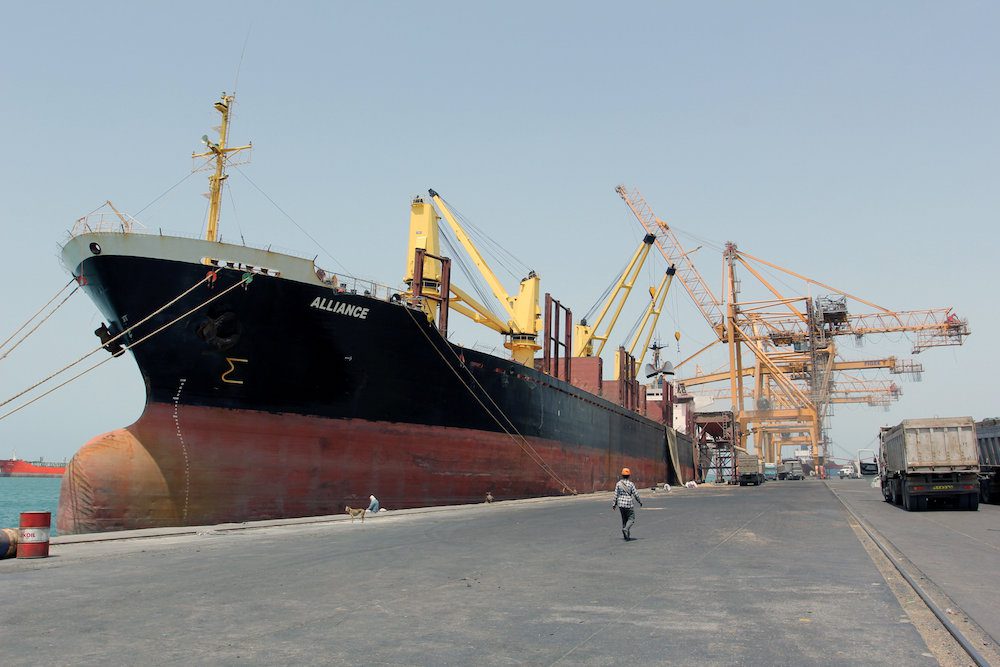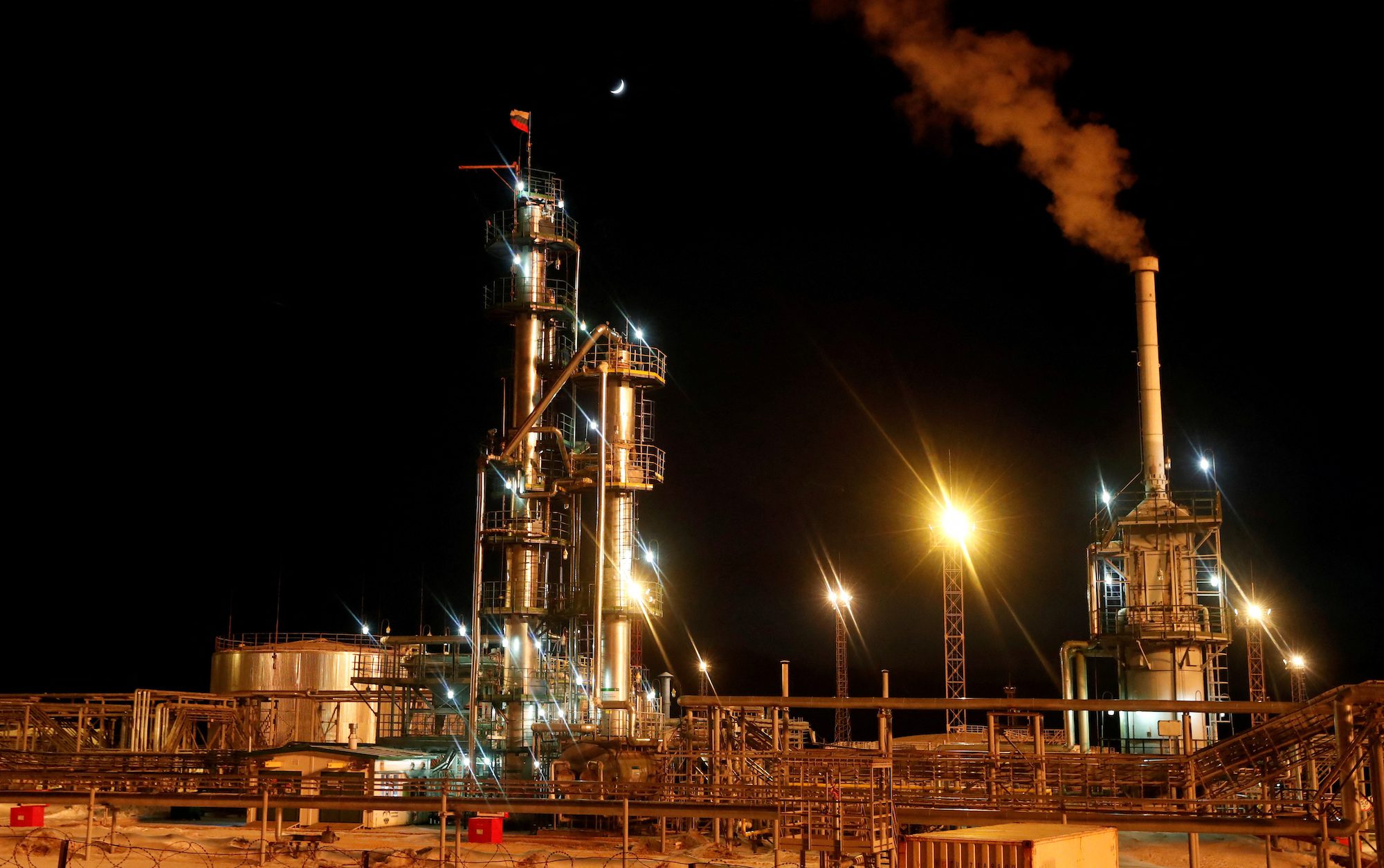A ship is docked at the Red Sea port of Hodeidah, Yemen, March 23, 2017. REUTERS/Abduljabbar Zeyad
 By Maha El Dahan and Michael Georgy
By Maha El Dahan and Michael Georgy
SHARJAH, United Arab Emirates, March 24 (Reuters) – Captains of small wooden dhows are carrying food and wares from the United Arab Emirates to war-torn Yemen. But supplies are falling even from this centuries-old Arabian sea route that is one of the last lifelines to a country on the brink of famine.
A two-year-old civil war has severely restricted the flow of food into the main Yemeni cargo ports of Hodeidah and Salif on the Red Sea, where all the large grain silos are located.
The small wooden boats sailing from souks in the UAE are moving small but vital supplies by making for the smaller ports to the south coast that are of little use to larger vessels – and often sidestepping military inspections that choke traffic by dropping anchor at secluded coves nearby.
The deals originate in the sprawling Al Ras Market, a collection of dusty alleyways near the Dubai Creek where an array of food and spices are on display including colorful sacks of Pakistani and Indian rice.
The dhows – plying the ancient trade route that once carried the likes of pearls, frankincense and myrrh – supply 14,000 to 18,000 tonnes of foodstuffs a month to Yemen, according to traders. That represents a drop of about 30-40 percent over the past year because of problems with payment, as well as adverse sailing conditions.
“The Yemeni currency is destroyed, sometimes we can’t get paid enough. We can only go once a month because the seas are too rough,” said trader Mohammed Hassan, at a docking station at nearby Port Khaled in Sharjah
“Sometimes we have to wait 40 days.”
The volumes of food carried on this route represent a small fraction of the supply to Yemen, which relies on imports for 90 percent of its food. But it has become increasingly important as fighting has raged, the economy has collapsed and Yemen has needed all the help it can get.
PORT DAMAGE
Thousands of people have been killed in the civil war pits the Iran-allied Houthi group against a Saudi-backed coalition – which includes the UAE – fighting to restore the government of President Abd-Rabbu Mansour Hadi.
The conflict has choked imports. Sixty percent of Yemenis, or 17 million people, are in “crisis” or “emergency” food situations, according to the United Nations.
While vessels seeking access to Houthi-held areas must face inspections for smuggled weapons, the government-controlled south has less restrictions.
Food imports into Hodeidah have fallen relentlessly, with only a few ships arriving each week – compared with dozens before the war – and more shipping lines pulling out due to the growing risks, according to aid and shipping sources.
In recent weeks damage to infrastructure in the neighboring port of Salif has also cut food deliveries, aid officials said.
“The country is living on its reserves,” said Robert Mardini, International Committee of the Red Cross regional director for the Near and Middle East in Geneva this week.
“There is a lack of liquidity, no payment of salaries, which means that the spending power has collapsed and that the price of food is soaring whenever it is available.”
‘PAY THUGS’
UAE-based dhow captains avoid these snarl-ups by steering clear of the big Red Sea ports and instead ply their trade to the south, often docking at informal inlets.
The average journey takes about five to eight days, with the boats capable of taking up to 2,000 tonnes of goods, still small fry compared with cargo ships that could provide more relief to one of the poorest and most unstable countries in the world.
Trader Ali Mahdani ships his goods out of Dubai to the southern Yemeni ports of Aden, Mukalla or Mokha, goods worth 4-6 million UAE dirhams ($1.1-1.6 million) per month, around 2,000 tonnes of mostly rice, spices or cooking oil. To avoid payments in the battered Yemeni currency he gets paid in Saudi riyals.
There are few issues upon arrival. That’s a sharp contrast the scrutiny that any vessels hoping to access the north would be subjected to as the Saudi-led coalition search for weapons which may be headed into Houthi hands.
“You may have to pay thugs every once in a while but otherwise it is all good to go,” said Mahdani, dressed in a flowing white robe.
Trader Amin Baghersh ships powered milk, tomato paste, sugar and rice from Al Ras to Yemen, selling about one million UAE dirhams worth per month.
He and others rely on hawala, an informal trading system through exchange houses based on trust and personal ties.
Most of his goods make their way to Mukalla and Aden and surrounding areas. But he, like others, has taken a heavy hit from the Yemeni currency crisis and payment problems caused by the war.
An Iranian trader had similar complaints.
“I used to transfer about 2,000 tonnes of food a month,” said the trader, who declined to give his name. “In the last three or four months people asked me for supplies but I am reluctant to deal with them.”
($1 = 3.6724 UAE dirham)
(Additional reporting by Jonathan Saul in London and Stephanie Nebehay in Geneva; Editing by Pravin Char.)
(c) Copyright Thomson Reuters 2017.
Note to the Trade Winds.

 Join The Club
Join The Club











